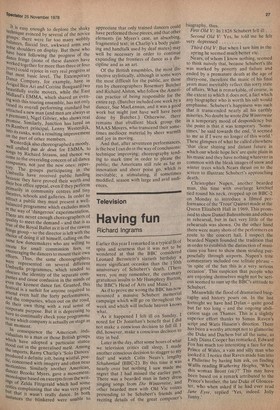Television
Having fun
Richard Ingrams
Earlier this year! remarked in a typical fit of spite and sourness that it was not to be wondered at that the BBC considered Leonard Bernstein's sixtieth birthday a more significant occasion than the 150th anniversary of Schubert's death. (There were, you may remember, the customary gratuitous insults to Mr Humphrey Billiton, the BBC's Head of Arts and Music.) As if to prove me wrong the BBC has now mounted a massive Schubert memorial campaign which will go on throughout the week and which will include heaven knows what. As it happened I felt ill on Sunday. I noted for Dr Jonathan's benefit that I did not make a conscious decision to fall ill. did, however, make a conscious decision to stay in bed. Later in the day, after some hours of what we television critics call sleep, I made another conscious decision to stagger to my feet and watch Colin Nears's lengthy Schubertiad (BBC-2). By this time it was nearly over but nothing I saw made me regret that I had missed the earlier part. There was a bearded man in fancy dress singing songs from Die Winterreise, and other bearded men with Old Vic voices pretending to be Schubert's friends and reciting details of the great composer's biography, thus.
First Old V: In 1826 Schubert fell ill. . Second Old V: Yes, he told me he felt very depressed Third Old V: But when I saw him in the spring he seemed much better etc.
Nears, of whom I know nothing, seemed to think naively that, because Schubert's life was marked by poverty and failure and ended by a premature death at the age of thirty-one, therefore the music of his final years must inevitably reflect this sorry state of affairs. What is remarkable, of course, is the extent to which it does not, a fact which any biographer who is worth his salt would emphasise. Schubert's happiness was such that it transcended nearly all his earthly miseries. No doubt he wrote Die Winterreise in a temporary mood of despondency but the point is that it was temporary. `Sometimes,' he said towards the end, 'it see.med to me as if I were no longer of this world.' These glimpses of what he called elsewhere 'that clear shining and distant future in which our whole hope lies' are quite plain in his music and they have nothing whatever in common with the bleak images of snow and winter trees which Nears thrust on to the screen to illustrate Schubert's approaching death.
Christopher Nupen, another bearded man, this time with overlarge kerchief tied round his neck, cropped up on BBC-2 on Monday to introduce a filmed performance of the `Trout' Quintet made at the Queen Elizabeth Hall in 1969. This promised to show Daniel Bahrenboim and others in rehearsal, but in fact very little of the rehearsals was shown. On the other hand there were many shots of the performers en route to the concert hall. I suspect the bearded Nupen founded the tradition that in order to establish the distinction of musicians you have to shciw them striding purposefully through airports. Nupen's trite commentary included one telltale phrase — 'in spite of the fun this is a very serious occasion'. This suspicion that people who are enjoying themselves might not be serious seemed to sum up the BBC's attitude to Schubert.
Meanwhile the flood of dramatised biography and history pours on. In the last fortnight we have had Dylan = quite good but far too long — and the ongoing abdication saga on Thames. This is a slightly superior effort thanks to Simon Raven's script and Waris Hussein's direction. There has been a worthy attempt not to glamorise the Duke and Duchess but all the same, as Lady Diana Cooper has remarked, Edward Fox has much too interesting a face for the Prince of Wales, a vain and silly man who looked it. I notice that Raven made him into a Philistine by having him ask, on finding Wallis reading Wuthering Heights, `Who's this woman Bront (sic)?' This may have been based on a remark attributed to the Prince's brother, the late Duke of Gloucester, who when asked if he had ever read Jane Eyre, replied `Yes, indeed. Jolly funny,'


































 Previous page
Previous page